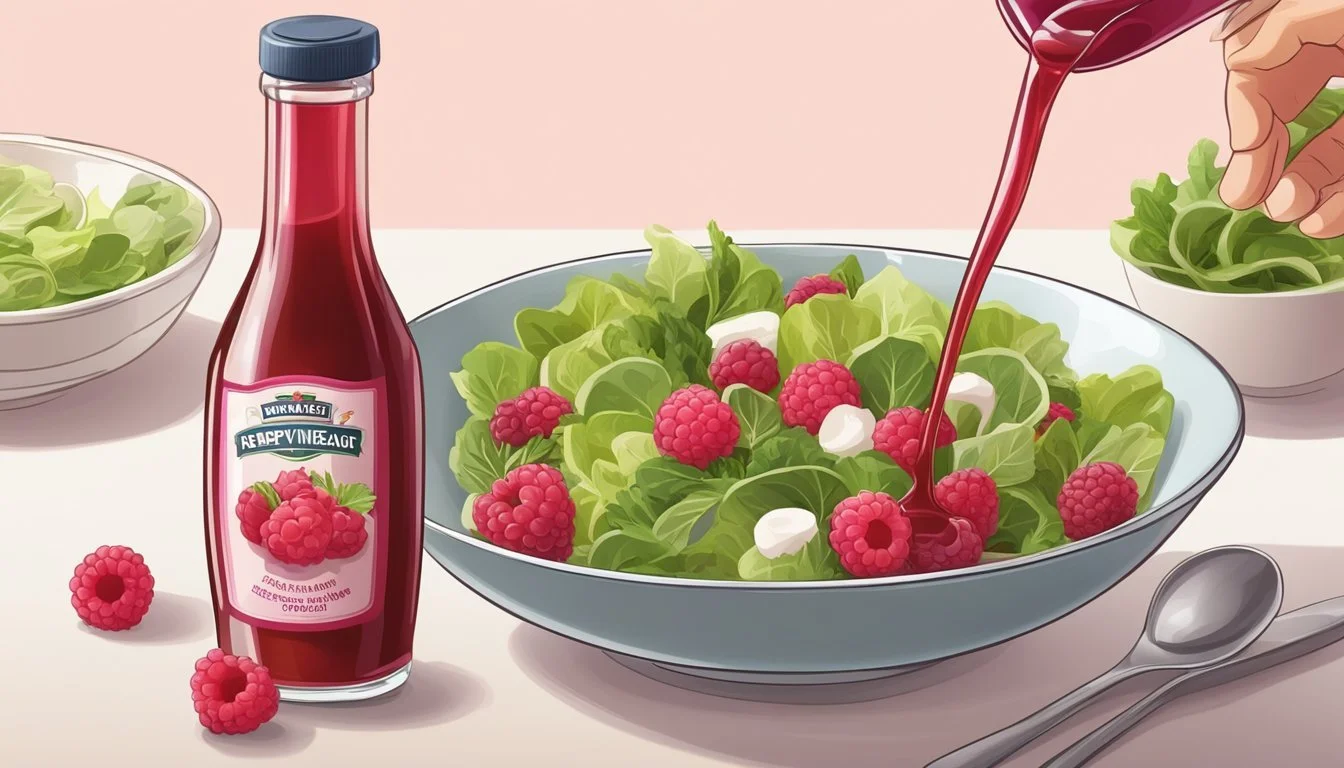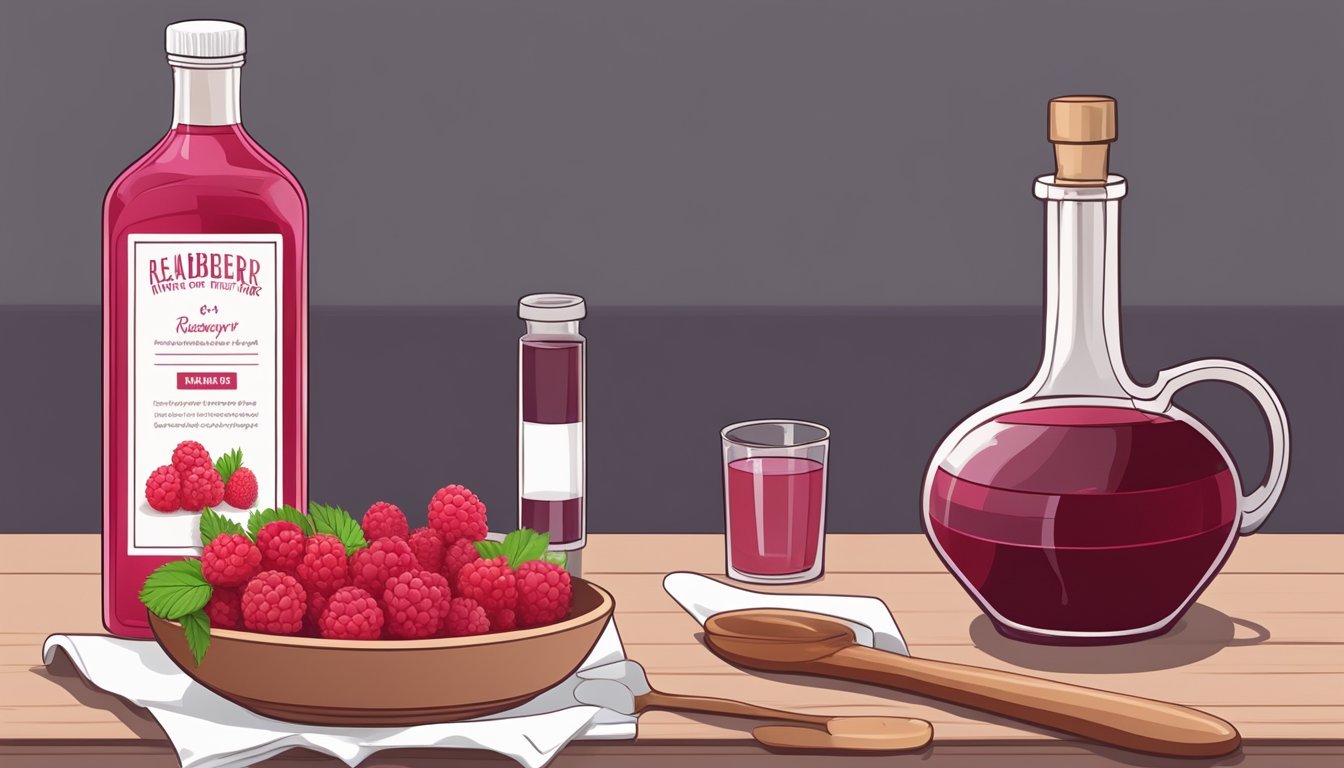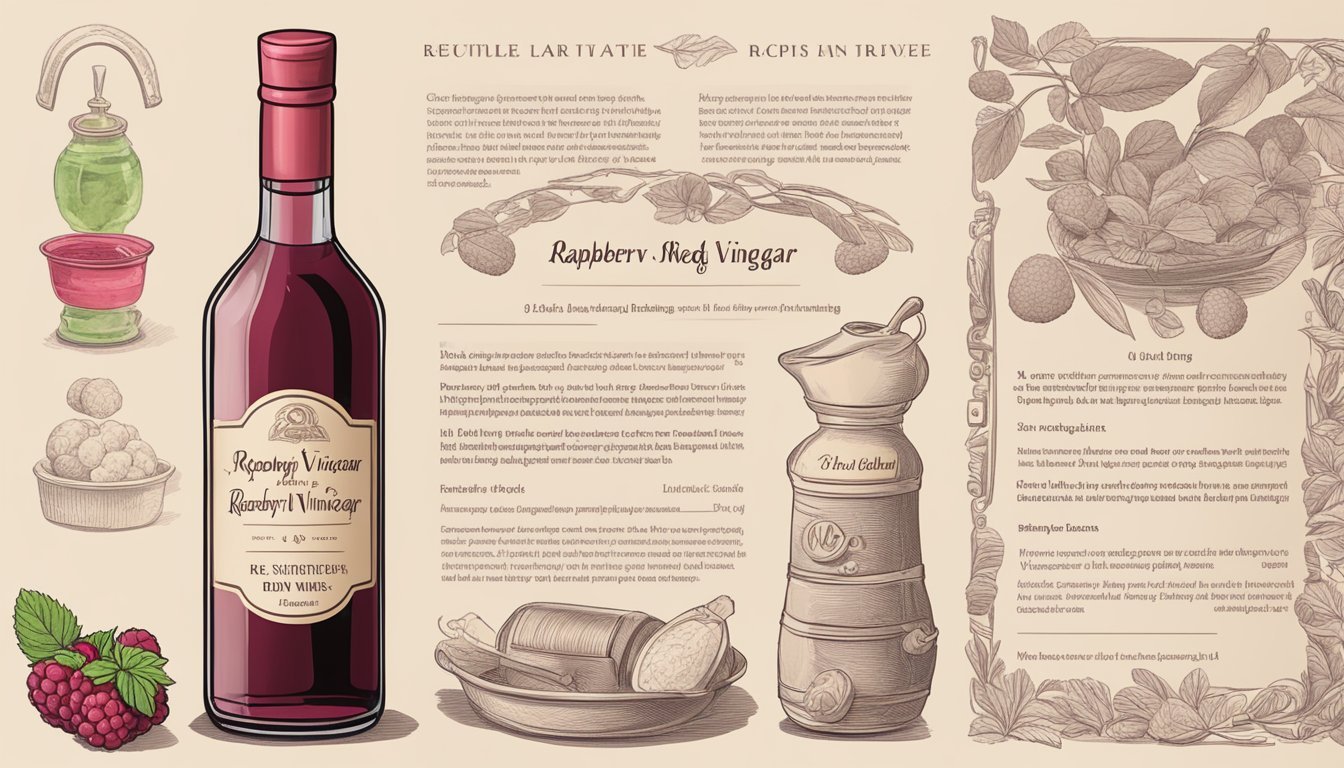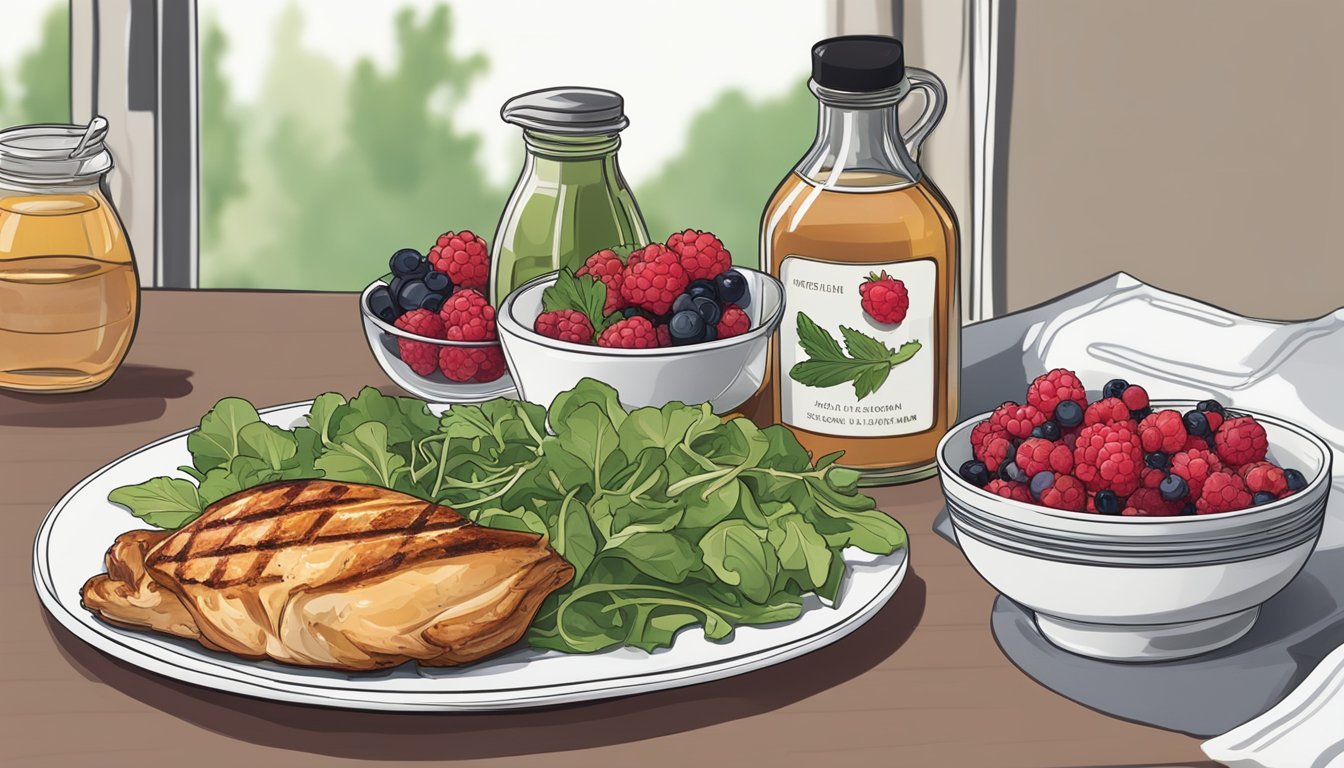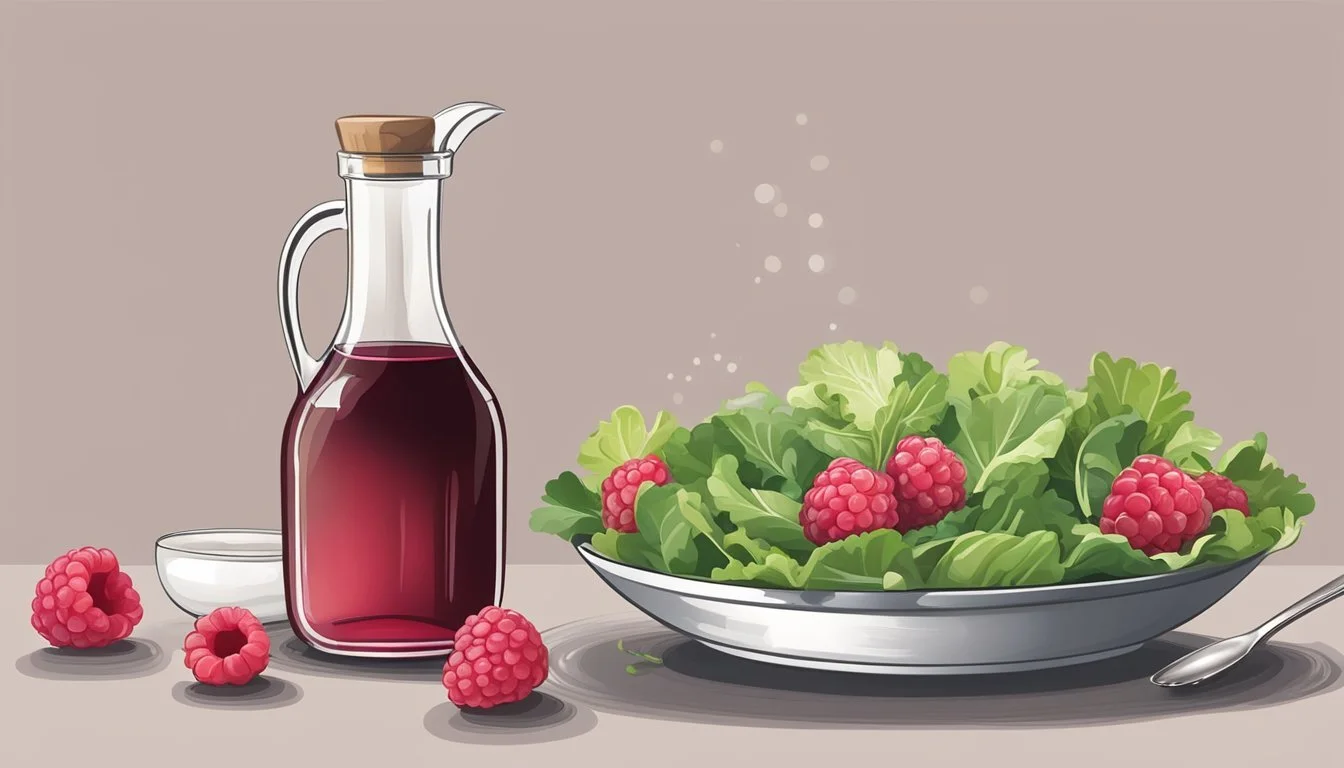How to Substitute Raspberry Vinegar for Red Wine Vinegar
Easy Swaps for Cooking Adjustments
Substituting raspberry vinegar for red wine vinegar can enhance a dish with a unique twist, adding a fruity undertone to the flavors. Raspberry vinegar possesses a vibrant, tangy taste that can complement vinaigrettes, marinades, and sauces. While red wine vinegar is known for its bold and tangy profile, raspberry vinegar offers a subtle sweetness and fruitiness that can be an intriguing alternative in various recipes.
The key to using raspberry vinegar as a substitute is understanding its flavor profile in comparison to red wine vinegar. Raspberry vinegar tends to be lighter and sweeter, making it well-suited for dishes that can benefit from a touch of fruitiness. When substituting, it is generally recommended to use a 1:1 ratio, meaning if a recipe calls for a tablespoon of red wine vinegar, one can use a tablespoon of raspberry vinegar in its place.
Adapting recipes to incorporate alternative ingredients offers the opportunity to personalize dishes and explore different flavor combinations. Although raspberry vinegar can be less common in stores than red wine vinegar, its use as a substitute is straightforward and can result in a delightful variation of a familiar taste, adding an unexpected but pleasant twist to one's culinary creations.
Understanding Vinegar and Acidity
Vinegar is a liquid produced through the fermentation of ethanol by acetic acid bacteria. During this process, ethanol is converted into acetic acid, which gives vinegar its characteristic sour taste and smell. The acidity of vinegar, a key component in its flavor profile, is measured by the percentage of acetic acid it contains.
Red wine vinegar and raspberry vinegar are both popular in cooking and share a similar acidic base, though their flavors differ due to the fruits from which they originate. Red wine vinegar, derived from fermented red wine, tends to have a robust flavor. Raspberry vinegar, made from fermented raspberries, offers a fruitier, milder option.
Acidity in vinegars like red wine vinegar typically ranges around:
5-7% acetic acid
While raspberry vinegar may have a similar acidity level, its fruitier flavor is a result of the raspberries used in its fermentation process. When substituting raspberry vinegar for red wine vinegar, one must consider the flavor differences. Generally, they can be substituted in equal measure:
1:1 ratio (raspberry vinegar wine vinegar)
However, the fruitier note of raspberry vinegar may be more prominent in the final dish. Cooking typically reduces the fruity overtones, making this substitution more suitable for recipes where the vinegar is cooked rather than used raw.
In summary, understanding the acidity and fermentation origins of these vinegars is crucial when substituting one for the other, ensuring the balance of flavor in culinary creations is maintained.
Comparison of Vinegar Types
In the culinary world, vinegars are essential for their ability to enhance flavors and add acidity to dishes. Each type has its distinct characteristics and can influence the taste profile of a meal differently.
Characteristics of Red Wine Vinegar
Red wine vinegar is known for its sharp, tangy flavor. The flavor profile of red wine vinegar is robust, making it a popular choice for vinaigrettes and marinades. Its acidity level can vary, but it typically falls around 5% to 7%, providing a strong presence in recipes it's featured in.
Raspberry Vinegar's Unique Profile
Raspberry vinegar, on the other hand, carries a noticeably fruity and slightly sweet tone, setting it apart from red wine vinegar. Its flavor can be intense yet balanced, often used to add a refreshing zest to salads and desserts.
Other Vinegar Substitutes
If one needs to substitute red wine vinegar, several other vinegars can come into play, each with a unique essence:
White Wine Vinegar: Milder than red, suitable for lighter sauces and dressings.
Balsamic Vinegar: Sweet and syrupy, best if used sparingly due to its dominant flavor.
Apple Cider Vinegar: It offers a fruity flavor, which includes subtle sweetness.
Sherry Vinegar: Rich and nutty, with a complexity that can mimic red wine vinegar's depth.
Rice Vinegar: Less acidic and sweeter, ideal for Asian dishes.
Champagne Vinegar: Delicate and light, can provide subtlety where red wine vinegar might overpower.
Malt Vinegar: Bold and assertive, best suited for pickling and British fish and chips (What wine goes well with fish and chips?).
White Vinegar: Sharp and clean, but lacks the nuanced flavors of wine-based vinegars.
Herb Vinegar: Infused with herbs, varies in acidity and flavor based on the infused elements.
Substituting Raspberry Vinegar
When substituting raspberry vinegar for red wine vinegar, attention must be given to the ratios used and flavor adjustments to ensure the integrity of the original dish is maintained.
Substitution Ratios and Adjustments
The general ratio for substituting raspberry vinegar for red wine vinegar is 1:1. However, due to raspberry vinegar’s slightly sweeter profile, one might consider reducing any additional sweeteners like sugar in the recipe. For instance, if a recipe calls for a tablespoon of red wine vinegar and a teaspoon of sugar, one can use a tablespoon of raspberry vinegar and omit the sugar.
Taste and Flavor Considerations
Raspberry vinegar offers a fruitier and mildly tangier flavor compared to the robust body of red wine vinegar. When using raspberry vinegar as a substitute, it’s important to account for its milder flavor and sweetness. Chefs might need to taste and adjust the dish to ensure the raspberry vinegar imparts a balanced, yet distinct taste, without overwhelming with fruitiness.
Creating a Balanced Dish
To create a balanced dish with raspberry vinegar as a substitute for red wine vinegar, it's beneficial to understand the flavor profile of the dish. The fruitiness of raspberry vinegar can enhance salads, marinades, and sauces that can benefit from a touch of sweetness. In contrast, dishes that require the boldness and full body of red wine vinegar might need an alternative substitute or additional ingredients, like a splash of lemon or lime for extra tanginess, to achieve the desired flavor balance.
Culinary Applications
When substituting raspberry vinegar for red wine vinegar, the distinctive fruity undertone of raspberry vinegar should be considered to ensure it complements the dish. This section explores how raspberry vinegar can be incorporated into various cooking practices to enhance flavors.
Incorporating Vinegar in Marinades
Raspberry vinegar serves as an effective meat tenderizer due to its acidic nature, fitting well for marinades, especially with lighter meats. A straightforward 1:1 substitution can be made when preparing marinades for poultry or seafood, where the fruity notes can offer a pleasing twist. For red meat, it's important to balance the sweetness with additional savory or umami flavors.
Enhancing Salad Dressings
Salad dressings and vinaigrettes gain a fresh, fruity vibrancy when raspberry vinegar is used in place of red wine vinegar. To create a fruity vinaigrette, mix three parts oil with one part raspberry vinegar, adding seasonings like salt, pepper, and herbs for a well-rounded flavor profile.
Versatility in Sauces and Deglazing
In preparing sauces, the tangy and slightly sweet qualities of raspberry vinegar can add complex flavors. When deglazing pans, it effectively lifts the fond (browned bits) from the pan, contributing both acidity and fruitiness to the finished sauce, making it suitable for dishes that can benefit from a hint of fruit.
Use in Pickling and Preserving
For pickling recipes, raspberry vinegar can replace red wine vinegar for a unique taste profile, particularly with vegetables that pair well with a fruity dimension. Preserve the crispness of your pickled items by maintaining the usual ratio of vinegar to water in your brine.
Health Considerations
When substituting raspberry vinegar for red wine vinegar, one should consider the nutritional impact in addition to the taste profile. They both offer health benefits, albeit with some differences in nutritional content and potential health implications.
Nutritional Benefits of Raspberry Vinegar
Raspberry vinegar is appreciated not only for its fruity flavor but also for its nutritional benefits. It contains antioxidants, which are compounds known to combat oxidative stress in the body and contribute to overall health. Antioxidants found in raspberry vinegar may include vitamin C and anthocyanins, the latter of which gives the berries their vibrant color and is associated with health benefits such as improved heart health and cholesterol levels.
Vitamin C: Important for immune function and skin health.
Anthocyanins: May help in reducing inflammation and improving cardiovascular health.
Comparing Health Benefits with Red Wine Vinegar
When compared with raspberry vinegar, red wine vinegar is similarly recognized for its antioxidant properties, particularly due to the presence of polyphenols. These polyphenols can also help to maintain heart health and manage cholesterol levels.
Polyphenols: Linked to better heart health and potentially aiding in cholesterol management.
Acetic Acid: Found in both vinegars, which has been associated with weight loss and blood sugar control.
Although both vinegars offer potential health benefits, red wine vinegar is often noted for its role in weight management. It's the acetic acid in red wine vinegar that is thought to help with weight loss by increasing feelings of fullness and reducing the accumulation of fat. Raspberry vinegar, while not typically linked directly to weight loss, can be part of a healthy, balanced diet and contribute to overall wellness.
One should always keep in mind their personal dietary needs and consult with a healthcare provider if they have specific health-related questions or concerns regarding vinegar consumption.
Making Homemade Raspberry Vinegar
Making homemade raspberry vinegar is a straightforward process that allows individuals to create a pantry staple with a personalized touch. One can control the flavor profiles and sweetness by adjusting the ingredients to match their preferences.
Simple Raspberry Vinegar Recipe
For a basic raspberry vinegar, one will need fresh raspberries and a base vinegar, typically white or apple cider vinegar, which are common in many household pantries. Following these steps, a flavorful vinegar is readily achieved:
Ingredients:
2 cups fresh raspberries
1 quart white or apple cider vinegar
Method:
Gently clean the raspberries and place them in a large glass bowl or jar.
Heat the vinegar, making sure not to boil it, and then pour it over the raspberries.
Allow the mixture to cool to room temperature before sealing the container.
Store the sealed container in a cool, dark place for one week, giving it a gentle shake daily.
After a week, strain the vinegar to remove the raspberry solids, bottling the liquid for use.
Infusion Techniques and Flavor Enhancements
To elevate the flavor profile of the basic recipe, one might consider incorporating various sweeteners, such as honey or molasses, for complexity and a deeper sweetness. Adding citrus juices, like lemon or lime, can introduce a refreshing tang, and for those seeking an inventive twist, a hint of nuttiness could be achieved by adding a small amount of almond extract. Here are specific techniques to enhance the infusion:
Sweeteners:
Add 1 to 2 tablespoons of honey or molasses during the heating of the vinegar for a richer sweetness.
Citrus Juices:
Include the juice of one lemon or lime to the raspberry-vinegar blend before the infusion process for a bright acidity.
Nutty Twist:
Introduce a few drops of almond extract to the mix before storing to infuse, imparting a subtle, nutty flavor.
By employing these techniques, one can transform a basic vinegar into a gourmet condiment that enhances a variety of dishes. The homemade version allows for full control over the ingredients and their quality, ensuring a superior fermenting result compared to store-bought alternatives.
Raspberry Vinegar Beyond the Kitchen
Raspberry vinegar, typically celebrated for its culinary uses, also offers versatility outside of food preparation. It can be an effective ingredient in creating eco-friendly cleaning solutions.
DIY Vinegar Cleaning Solutions
Raspberry vinegar's acidic nature makes it suitable for various cleaning tasks around the home. Here are some specific ways it can be incorporated into homemade cleaners:
Glass Cleaner: Mix equal parts of raspberry vinegar and water to create a streak-free solution for cleaning windows and mirrors.
All-Purpose Cleaner: Combine raspberry vinegar with water in a 1:1 ratio, add a few drops of essential oil for fragrance, and use to wipe down kitchen counters, appliances, and other surfaces.
Microwave Cleaner: Add a tablespoon of raspberry vinegar to a cup of water, microwave for two minutes, and then wipe the interior easily due to the steam created.
Fabric Softener: Use half a cup of raspberry vinegar during the rinse cycle for softer clothes without chemical residues.
Pairing Raspberry Vinegar with Foods
Raspberry vinegar, with its vibrant and fruity notes, can elevate various dishes with an added depth of flavor. It pairs exceptionally well with Mediterranean-style cuisine, seafood, light meats, cheese, and fresh fruits.
Matching with Mediterranean-Style Dishes
When incorporated into Mediterranean-style dishes, raspberry vinegar complements the flavors inherent to this cuisine. It works particularly well in gazpachos or salads dressed with extra virgin olive oil. The vinegar's bright acidity cuts through the richness of olive oil, balancing the dish.
Complementing Seafood and Light Meats
Seafood: Raspberry vinegar can add a refreshing twist to seafood dishes. (What wine goes well with seafood dishes?) It helps to accentuate the delicate flavors of fish and shellfish.
White Meat: (What wine goes well with white meat?) When used as a marinade or glaze, raspberry vinegar enhances the taste of chicken and turkey, imparting a subtle, fruit-forward zing.
Accompanying Cheese and Fresh Fruits
Cheese: The tart and slightly sweet profile of raspberry vinegar pairs well with a range of cheeses, from creamy brie to tangy goat cheese.
Fresh Berries: Drizzling raspberry vinegar over fresh berries can intensify their natural sweetness and add a pleasant complexity to dessert or salad courses.
Culinary Tips for Using Raspberry Vinegar
Raspberry vinegar offers a unique blend of sweetness and acidity, adaptable across various recipes. Its versatile flavor profile complements a range of dishes, from Spanish tapas to Asian cuisine.
Adjusting Sweetness and Acidity in Recipes
Raspberry vinegar is particularly useful for fine-tuning the balance of sweetness and tang in a dish. When substituting for red wine vinegar, cooks might want to consider the following:
Sweetness: Raspberry vinegar inherently contains fruity notes. If a recipe requires less sweetness, one could reduce the sugar added elsewhere in the dish or add a touch of sour tamarind fruit to counter the sweet edge.
Acidity: If a recipe needs a sharper tang to mimic the acidity levels typically contributed by red wine vinegar, one might add a bit of lemon or lime juice.
Innovative Uses in Spanish and Asian Cuisine
Raspberry vinegar isn't just for salad dressings; it can become a star ingredient in a variety of dishes:
Spanish Dishes: Employ raspberry vinegar to create a gazpacho with a twist, or use it in a marinade for pinchos morunos (marinated skewered meat), enhancing the dish with its fruity undertones.
Asian Dishes: In Asian cuisine, raspberry vinegar's sweetness elevates the flavors in sweet and sour sauces. One can also use it to make a dipping sauce, blending tamarind paste and raspberry vinegar for a unique flavor combination.
Experimenting with Herbs and Spices
The infusion of herbs and spices can make raspberry vinegar even more versatile:
Fig: For a Mediterranean flair, infuse raspberry vinegar with fig, which complements the sweetness and adds depth.
Fermented Apples: In sauces and chutneys, a combination of fermented apples and raspberry vinegar can result in a nuanced flavor profile.
Rosemary and Thyme: These herbs pair exceptionally well with raspberry vinegar when marinating meats or vegetables, offering a harmonic convergence of flavors.
By considering these tips, cooks can effectively integrate raspberry vinegar into their culinary repertoire, balancing its distinct sweetness and acidity to suit an array of delightful dishes.
Food Preservation with Raspberry Vinegar
Raspberry vinegar, with its distinct fruity flavor, offers more than just a taste enhancer; it serves as an excellent preservative for various foods.
Enhancing Flavor and Lifespan of Preserves
Pickling with Raspberry Vinegar: Preserving food through pickling is a time-honored method to extend the shelf life of fruits and vegetables. Using raspberry vinegar in pickling can introduce a unique, sweet, and tangy profile to the preserved items, distinguishing them from those made with more conventional vinegars. As a pantry staple, raspberry vinegar's acidic nature inhibits bacterial growth, ensuring pickled goods remain safe and delicious for longer periods.
Raspberry Vinegar and Fermentation: During the fermentation process, the acetic acid present in raspberry vinegar can act as a stabilizer for the environment in which fruits and vegetables are fermenting, thus helping to preserve the natural flavors and textures. It plays an essential role in creating the optimal conditions for safe fermentation, and ultimately, the formation of probiotics. Raspberry vinegar's delicate flavor also complements the fermentation's outcome by adding a nuanced berry note.
Closing Thoughts
When substituting raspberry vinegar for red wine vinegar, one should consider the profile of the dish they're preparing. Raspberry vinegar imparts a fruity undertone which complements salads, dressings, and sauces that can benefit from a hint of sweetness. It is also important to bear in mind the potential color change that might occur due to the distinct hues of raspberry vinegar.
In terms of quantity, the substitution can generally be made on a 1:1 basis, but cooks should taste as they go, making adjustments to achieve the desired flavor balance in their recipe. Although raspberry vinegar can successfully replicate the acidity of red wine vinegar, it's wise to start with a slightly reduced amount and add more if needed.
For those concerned with the subtle taste differences, blending raspberry vinegar with a milder vinegar, like white wine vinegar, might yield a closer match to red wine vinegar. This approach allows for a controlled integration of fruity notes while maintaining the acidity required.
Here's a succinct reference table for substitutions:
Substitute Ratio Consideration Raspberry Vinegar 1:1 Fruity flavor Blended with Mild Vinegar 1:1 Blend to taste
By considering these nuances, those substituting raspberry vinegar for red wine vinegar should feel confident that they can achieve a harmonious outcome in their culinary creations.

